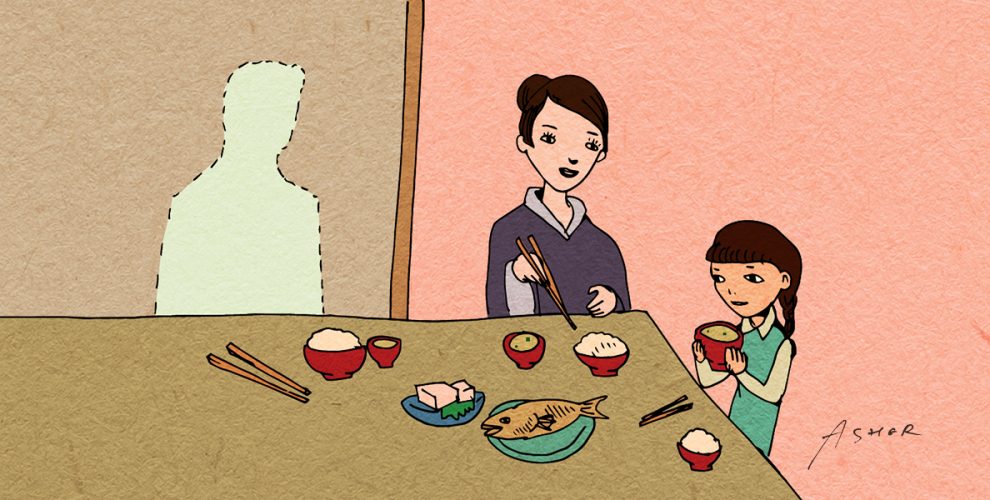Japan Rental Families
Mr Inaba is a kind, loving father to his daughter, Mana. He attends parent-teacher meets, goes to the onsen with her and brings her to Disneyland. He is the perfect father; except, he is just acting.
The role of Mr Inaba is played by Yūichi Ishii, the founder of Family Romance, which rents actors to play family members for clients. The real Mr Inaba divorced Mana’s mom, Reiko, shortly after Mana was born.
Mana had difficulty adjusting to school life, being bullied for not having a dad. She would spend all day in the nurse’s office or hide in her room.
Reiko decided to take action and requested for a play-act dad via Family Romance. Gradually, Mana opened up to Ishii and her behaviour improved within months.
Ishii charges about S$250 for four-hour slots. Reiko hires him about twice a month for four to eight-hour slots. She cuts down on food and clothing spending to pay for his services.
Mana is currently 19 years old and does not know Ishii is just a dad actor. Reiko tells Mana that Ishii has another family and hence cannot see their family as regularly.
The Business of Family Romance
Family Romance has a database of 1,200 freelance actors. Its moniker Family Romance is taken from a Sigmund Freud essay ‘The Family Romance of Neurotics’ (1909).
Freud theorised that children believe their parents are imposters and that their real parents are royalty, hidden somewhere. This fantasy helps children tide over the hard truth of witnessing the imperfect side of their parents which enables them to grow up.
One bulk of Family Romance’s business involves fake weddings, which cost up to S$61,000. Sometimes, even the groom is fake and played by Ishii himself. The best men are professional speechmakers and often bring guests to tears with their speech.
In one case, a wife had become overweight and the husband hired a slimmer actress from Family Romance to be his ‘wife’ when meeting his friends. She has also played the mom of children who are afraid of being bullied for having overweight moms.
Family Romance is open to take on any client’s request to play a role in a family, workplace or social situation. Companies have hired Ishii and his actors to take scoldings from their customers, to reprimand senior-level bosses who need ‘discipline’ and to apologize for a wife’s unfaithfulness.
By playing the role of the third party and apologizing to the cuckolded husband, it helped to diffuse the anger of the husband. In some way, it allowed the couple to find closure on the extramarital affair.
Play-acting with real results
These rental actors help fill a gap for a missing role in a family, work or social context. While the performance is fake, the results can be real.
In Japan, there is a concept of a private life or original intention (本音 honne) versus a public face (建て前 tatemae). To balance the two is a virtue and responsibility. In a sense, the artificiality of performance is not hypocrisy but dutiful.
For example, one man hired fake parents for his wedding. Upon confessing to his wife, the wife did not blame, but instead, thanked him for avoiding potential trouble.
It makes me wonder… does such family play-acting have a place in Singapore?
How Different Or Similar Is Singapore And Japan
In Japan, the ‘guidelines’ of original intention (本音 honne) and public face (建て前 tatemae) is very pronounced. Even in the workplace, one should always act deferentially to their bosses even whilst harbouring differing opinions. Though of course, that culture varies from workplace to workplace.
Interestingly, I worked as a teacher in Japan for a year and hardly played by those rules. Many found my direct manner refreshing; some absolutely hated it. This serves as a caution against painting a sweeping view of an entire society as diversity exists even in small microcosms.
Singapore a culturally young nation with a diversity of races. Still, one can say that Singaporeans care a lot about face-value.
I have increasingly heard of local portals where you can rent boyfriends to accompany you to Chinese New Year visits to avoid querying relatives.
Do we consider this the start of such family-rental services?
Most Singaporeans would baulk at the idea of having a fake dad, a fake spouse or even a fake scapegoat. Even if the end result could be healing and cathartic, we find it hard to stomach a process that is deemed as fake.
Role-play Psychotherapy
In another case study, a salaryman in his 60s, Kazushige Nishida, rented a part-time wife and daughter after his wife passed away. Six months prior, their daughter left home after an argument.
Nishida thought that his grief would soon pass and he would then be able to move on with life. However, the sense of loneliness awaiting him after a long day’s work began to feel overwhelming. He tried going to hostess clubs to talk to ladies, but it left him feeling empty after spending the money at the end of the night.
One day, Nishida learnt about Family Romance’s services from television and decided to hire a wife and daughter.
On their first meeting at a cafe, the actresses gained a deeper understanding on how Nishida’s actual wife and daughter would behave and incorporated it when they were ‘on set’.
On their second meeting, the actresses visited Nishida’s home, cooked okonomiyaki (Japanese-style pancake), had dinner and watched television together.
Once rapport was built, Nishida sent the actresses a copy of his house key. One night, he came home after a long day at work to find the lights on, the house warm, and a wife and daughter present to say, “Welcome home.”
With more familiarity, the actresses sometimes broke their roles. The rental wife would complain about her actual husband, with Nishida giving advice. This loosening of roles signalled to Nishida that even in his ‘real’ family, he had often ‘acted’ without revealing his true feelings to his kin.
Upon this revelation, Nishida was able to lighten up and converse with the actresses about his real daughter. The rental daughter was then able to provide perspective from a younger person’s point of view.
Nishida learnt that his reaction had created a barrier, making it hard for his actual daughter to apologise. This prompted Nishida to call his real daughter, requesting her to return; and she did—he came home from work one day and found fresh flowers on his wife’s altar, placed by his actual daughter.
Nishida believes this result was only achieved because his rental daughter was not his real kin, giving him a freedom to express himself to find the answers he needed. No different from how we find it easier to open up to strangers than to those close to us.
This story makes me think about my own dad, a stoic man of few words, hardly expressing affirmation. I wonder if having a rental dad, like Mana, who encouraged me often would have changed me fundamentally. Perhaps, I would have more confidence in growing up.
These actors can help others channel and allow suppressed feelings to surface, so they might find a place of balance before moving on to face new challenges.
These stories make me wonder if all our family and social roles, such as weddings or reunion dinners, are not just a type of performance anyway.
Read the original story of ‘Japan’s Rent-A-Family Industry’ in The New Yorker.
Cover Illustration by Asher Mak
Also read:








